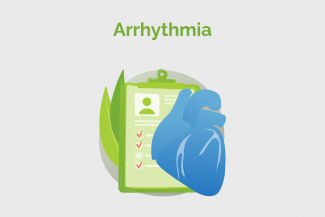
Everything you need to know about irregular heartbeats. By Dr Shital Raval
What is an arrhythmia?
An arrhythmia is a disturbance of the usual electrical rhythm of the heart. It can occur regularly or just occasionally. Arrhythmias are disorders of the heart’s electrical system, which means there is a change in the regular beat. This can be as a result of the conduction pathway being damaged or blocked, or because an extra pathway is present. The heart may beat too quickly (tachycardia), or too slowly (bradycardia) or irregularly, all of which may affect the heart’s ability to pump blood around the body.
How does the heart beat?
The heart beats when a small electrical current is generated by the heart’s conduction system. This cardiac conduction system consists of tiny cells in the walls of the heart muscle. A normal heart beat ranges from 60 to 100 beats per minute. The heart beats in the following way:
- The sinoatrial node (SA node) known as the heart's "pacemaker" sends out electrical impulses at regular intervals, causing the heart to beat at a Normal sinus rhythm. The SA node sets the rate and rhythm of your heartbeat.
- The atrioventricular node (AV node) is the electrical "relay station" between the upper (atria) and lower (ventricles) heart chambers.
- His – Purkinje network: This pathway of fibers sends the impulse to the muscular walls of the ventricles and causes them to contract. This forces blood to be pumped out of the heart to the lungs and body.
Are arrhythmias fatal?
There are several different types of arrhythmia. Generally, arrhythmias that occur from the upper chambers of the heart (supraventricular or atrial) cause symptoms but tend to be less serious. Arrhythmias that arise from the lower chambers (ventricular) can cause severe symptoms and can sometimes be fatal.
Arrhythmia should not be dismissed, and it is always advisable to get it checked out. Most palpitations are harmless, but they must be investigated. If an arrhythmia occurs in a patient who already has heart disease, such as a previous heart attack, heart valve disease or abnormal heart muscle, this can be a sign that there is a more serious problem.
What are the different types of arrhythmias? http://www.patientsengage.com/conditions/arrhythmia/types-stages
What are the causes of arrhythmia? http://www.patientsengage.com/conditions/arrhythmia/causes-risk-factors
What are the symptoms of an arrhythmia? http://www.patientsengage.com/conditions/arrhythmia/signs-symptoms
What diagnostic tests are conducted to detect an arrhythmia? http://www.patientsengage.com/conditions/arrhythmia/diagnosis-tests
How is it treated? http://www.patientsengage.com/conditions/arrhythmia/treatments
Any lifestyle changes that may prevent arrhythmia?
http://www.patientsengage.com/conditions/arrhythmia/prevention







